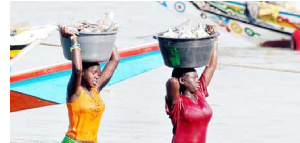Ukerewe Mariam (30) narrates how it has been difficult to work for fishermen on a fishing island and how she endures some abusive language to earn a living.
She says to work on a fishing island, one has to be strong enough. This is because most fishermen there would ask for sex in return for menial jobs as cooks or offloading fish from the boat.
Mariam left her husband in 2016 after he brought another woman into their homestead as a second wife. She left him with five children and moved to Ukara Island to work in the fishing community there.
Ukara is one of the two major islands in Ukerewe district. It is 10 kilometres or 45 minutes away from Ukerewe, the main island, where Nansio, the headquarters of the district, is located.
According to her, she could not withstand domestic battering; thus, she moved from Nansio to Ukara, thinking employment would be her only saviour, but things didn’t go as she planned because some fishermen asked for sex before hiring her.
When she realised that she had to offer her body to get a job, she decided to fall in love with one man so that she could be hired as a cook.
I decided to carry his child because I wanted a job and also to avoid men chasing after me. But after giving birth, other men were still asking for sex. It is not an easy job to work on a fishing island because every man wants to be with every woman.
She explains that she thought having a child with another man would prevent other men from asking for sex. On the contrary, when she refused to have sex with other men, she ended up receiving insults and abusive language.
Mariam further says that she had to get used to insults as a price for avoiding having sex with everyone.
“Generally, life is hard on the island. One has to be strong to work here. Also, the amount paid each month is not enough. We usually get paid Sh50,000 every 15 days to cook for a group of 15 men, wash the dishes, and offload fish from the boat,” Mariam says.
A leader on Ukara Island Mr Mkama Tembu admits that women who work on the island face various challenges due to some factors.
“A number of women who have decided to work on the island go through several challenges. Men create a difficult environment for them that is difficult to withstand,” he said.
In the past, the norms and customs of Ukerewe did not allow women to work or stay near the island because it was believed that when women were engaged in fishing activities, the fish catches would disappear.
Because of climate change and changes in lifestyle, women are now engaged in fishing activities. Others have become fishmongers, while some work as cooks and are also engaged in offloading fish from the boat, falling prey to men who seek to take advantage of them.
Here, men do not propose love or ask for a hand in marriage. What happens here is that when a man wants to fulfil his desires, he just asks to exchange sex for fish, sex for employment, and sex for money.
Mr Tembu, who also supervises fishermen in Ukara, noted that sometimes a man could just go to a woman and ask her how much it would cost to have sex with him.
They have set a standard price; for instance, it costs Sh15000 to have sex without a condom, and the lowest is Sh5000 to Sh3000 with a condom. So when the two agree on the amount, a woman would direct a man where to find her.
He explains: “Most women who are hired to work here must be involved in love affairs with the fishermen before they can be hired to perform menial jobs.”
When a woman refuses to have sex with them, they insult her and use abusive words. Sometimes they can get physical, throwing women’s buckets around to frustrate them.
The harassment would go on, and if the woman had already been hired, they would make it difficult for her to perform her job until she acquiesced to their demands.
Ukara councillor, Ms Experancia Matuzi, said they deal with different types of people who have different behaviours.
“When someone tells you that he is a fisherman, it means he is really a fisherman because some fishermen here are confused,” she says.
She adds; “Here in Ukara, there are some fishermen who behave like they are mentally disordered, and we do not allow them to play with our minds because if we tolerate them, it becomes difficult to control them.”
She says currently, they are working hard to create awareness for women to engage in improved farming and village community banking (Vicoba). With the current difficult economic situation, many people emigrate to Ukara to look for work so that they can at least earn some money to feed their families.
Ukerewe District Commissioner Hassan Bomboko said it is the same situation on Ukerewe Island, where the main economic activity is fishing.
“From generation to generation, residents have been fishermen; thus, through our office, we have embarked on creating an enabling environment for them to allow others to get involved in other activities,” he said.
He noted that there are some potential islands that have not been utilised or tapped, so his office is currently looking for investors to invest in islands in order to create employment for locals.
The 2023 Legal Human Rights Centre (LHRC) report, dubbed Impact of Climate Change on Socio-Economic and Environmental Rights in Tanzania, stressed that climate change is one of the global threats compromising the realisation and fulfilment of human rights.
Evidence from recent studies shows that climate change directly contributes to the violation of human rights in many different ways.
This includes increased risks from climate extremes ranging from droughts to floods that lead to loss of shelter, food shortages, breakdown of critical infrastructure, including schools and health facilities, increased human and animal diseases and pests, and disruption of habitats and critical ecosystem services that underpin survival, wellbeing, and enjoyment of life.
Various climate change studies, including the most recent report by the authoritative Intergovernmental Panel on Climate Change (IPCC AR 6), reaffirm this, overwhelmingly asserting that humanity is headed down a dangerous path towards a warmer, more volatile, and less secure world. Despite these apparent risks, the link between climate change and human rights is yet to be fully comprehended and worked out, both globally and locally.
This is particularly the case in Tanzania, where, in spite of a growing body of evidence on the impacts of climate change on all sectors, there hasn’t been any comprehensive study conducted to assess how the changing climate is impacting the enjoyment of human rights and what modern duty bearers are doing to protect relevant human rights.
Source: thecitizen.co.tz
 Home Of Ghana News Ghana News, Entertainment And More
Home Of Ghana News Ghana News, Entertainment And More





